Supplements for Supporting Emotional Healing and Self-Identity
Introduction
Healing emotionally after years of stress, loss, or unhealthy dynamics isn’t just about mindset—it’s also about biology. The process of reclaiming your self-identity involves rebuilding both your mind and body after they’ve been shaped by survival patterns. When you’ve lived in constant emotional overdrive—whether through trauma, co-dependency, burnout, or self-doubt—your brain chemistry, hormones, and nervous system can become depleted.
That’s why emotional healing requires more than introspection. It also requires biochemical nourishment—the nutrients and compounds that restore balance to your neurotransmitters, lower inflammation, and bring your nervous system back to safety.
In this article, we’ll explore how emotional wounds affect your biology and how specific supplements can support self-identity, confidence, and emotional recovery. 🌸
Looking for supplements for This? Click here.
The Biology of Emotional Healing 🧠💗

When your self-worth depends on others’ approval or when you’ve lived in a state of stress, your body adapts by shifting into survival mode. The brain’s limbic system—the emotional center—becomes overactive, while regions responsible for self-reflection and calm (like the prefrontal cortex) go offline.
In this state, you might:
💭 doubt yourself constantly
💓 feel anxious about being misunderstood
🌙 struggle with fatigue or burnout
💫 lose your sense of who you are
Prolonged stress drains neurotransmitters like serotonin, dopamine, and GABA—the very chemicals that regulate emotional stability and motivation. It also exhausts the adrenal glands, leading to hormonal imbalances and nutrient depletion.
That’s why emotional healing often begins with nourishing your nervous system. When your body feels safe again, your identity naturally begins to rebuild itself.
Supplements as Emotional Allies 🌿
Supplements aren’t quick fixes—but they can serve as gentle guides, helping your brain and body stabilize so you can do the deeper work of therapy, reflection, and growth.
Let’s explore some of the most powerful nutrients that support emotional healing and identity reconstruction.
Omega-3 Fatty Acids: Building Emotional Flexibility 🌊
Omega-3s (EPA and DHA) are essential fats that make up the structure of brain cells and regulate neurotransmission. They reduce inflammation, enhance serotonin activity, and improve emotional resilience.
Studies show omega-3s can help with:
🌿 reducing anxiety and depressive symptoms
🌿 improving cognitive clarity and self-reflection
🌿 stabilizing mood swings and emotional reactivity
When your brain’s membranes are nourished, you think more clearly, feel emotions without being consumed by them, and reconnect with a sense of purpose.
Sources: Fish oil, algae oil (for vegans), salmon, walnuts, chia, flaxseed.
Magnesium: The Mineral of Emotional Safety 🌙
Magnesium is one of the body’s most crucial calming minerals. It regulates GABA, serotonin, and the HPA axis (your stress-response system). When you’re magnesium deficient, you’re more likely to experience anxiety, restlessness, and intrusive thoughts.
For people recovering from emotional dependence or identity loss, magnesium helps quiet the internal noise, easing muscle tension and promoting deeper sleep.
Best forms: Magnesium glycinate (for calm), magnesium threonate (for brain support).
B Vitamins: Rebuilding Energy and Confidence 🌞
The B-vitamin family—especially B6, B9 (folate), and B12—is vital for neurotransmitter synthesis and energy production. Chronic emotional stress depletes these vitamins, leading to fatigue, brain fog, and low motivation.
B vitamins help you feel like yourself again by:
💫 improving mental focus and memory
💗 supporting serotonin and dopamine production
🌸 boosting confidence through balanced energy
When your biochemistry supports clarity, you begin to feel more grounded in who you are—less reactive, more intentional.
Sources: Eggs, lentils, nutritional yeast, leafy greens, B-complex supplements.
Looking for supplements for This? Click here.
Vitamin D: Restoring Inner Light ☀️
Vitamin D isn’t just for bone health—it’s also a neurosteroid hormone that regulates mood and emotion. Low levels are linked with depression, disconnection, and low self-worth.
Vitamin D helps your brain absorb serotonin and dopamine more efficiently, supporting emotional resilience and self-trust.
It’s especially important for people healing from emotional trauma, as sunlight exposure and warmth naturally help re-establish safety cues in the body.
Sources: Sunlight, fatty fish, fortified foods, D3 supplements (with K2 for absorption).
L-Theanine: Cultivating Calm Awareness 🍵
Found in green tea, L-theanine increases alpha brain waves—those associated with calm focus and creativity.
L-theanine helps reduce anxiety without sedation, making it ideal for people learning to regulate emotions or boundaries. It works synergistically with GABA, dopamine, and serotonin, promoting emotional clarity and self-compassion.
Imagine being able to pause before reacting—that’s the neurochemical gift of L-theanine.
Tip: Combine with magnesium or GABA supplements for deeper calm.
GABA: The Peace Neurotransmitter 🌿
Gamma-Aminobutyric Acid (GABA) is your brain’s natural brake pedal. It slows overactivity in the nervous system, creating feelings of safety and presence.
Many people with emotional trauma or co-dependency have low GABA due to chronic cortisol elevation. Supplementing can help restore inner stillness, supporting groundedness and emotional boundaries.
When your body feels peaceful, your mind stops searching for external validation. That’s when true self-identity starts to form.
Note: GABA can be taken alone or enhanced through precursors like L-theanine, magnesium, or taurine.
Rhodiola Rosea: The Resilience Root 🌺
Rhodiola is an adaptogen—a natural plant compound that strengthens your body’s ability to handle stress. It normalizes cortisol levels, supports energy without overstimulation, and improves mental focus.
For emotional healing, Rhodiola helps by:
🌿 reducing fatigue from emotional burnout
🌿 improving clarity and motivation
🌿 lifting mild depressive symptoms
It’s particularly beneficial for those rebuilding a sense of direction after loss or prolonged emotional dependence.
Ashwagandha: Reclaiming Calm and Confidence 🌿
Ashwagandha, another powerful adaptogen, helps quiet the body’s overactive stress response. It lowers cortisol, supports thyroid health, and promotes emotional balance.
Ashwagandha helps you feel calm enough to reflect without dissociating. It rebuilds inner strength and stabilizes mood, making it easier to establish independence and grounded self-worth.
Think of it as nature’s reminder that you can be both strong and soft.
Best time to take: Evening or before stressful moments.
NAC (N-Acetyl Cysteine): The Detoxifier for Emotional Clarity 🧬
NAC is a precursor to glutathione, the body’s master antioxidant. It helps detoxify both physical and emotional stress residue.
In the brain, NAC modulates glutamate, the neurotransmitter involved in emotional reactivity and rumination. It’s been shown to reduce obsessive thinking and support recovery from emotional addiction patterns.
If you’ve ever felt “stuck in your thoughts,” NAC helps loosen that grip, creating space for healthier inner dialogue.
Probiotics and Gut-Brain Balance 🌾
The gut produces over 90% of your serotonin, meaning your emotional well-being depends heavily on gut health.
Stress and poor diet disrupt gut bacteria, causing inflammation and mood instability. Probiotics help restore this microbiome balance, which improves emotional stability and resilience.
Strains like Lactobacillus rhamnosus and Bifidobacterium longum have shown direct effects on lowering anxiety and improving mood.
Tip: Pair probiotics with prebiotics (fiber from fruits and vegetables) for sustained results.
Zinc and Selenium: Trace Minerals for Self-Repair ⚡
Zinc and selenium act as cofactors for antioxidant enzymes, protecting your cells from stress damage. Both are essential for thyroid balance, immune strength, and neurotransmitter regulation.
Zinc helps with emotional clarity and assertiveness, while selenium supports detoxification and hormone regulation. Together, they create a biochemical foundation for self-trust and energy stability.
Sources: Pumpkin seeds, Brazil nuts, lentils, seafood, or quality trace mineral supplements.
CoQ10: Rebuilding Energy and Motivation ⚡
Emotional fatigue often stems from mitochondrial dysfunction—when your cells can’t produce enough energy. Coenzyme Q10 (CoQ10) supports ATP production and protects cells from oxidative stress.
When your energy returns, so does your motivation and sense of agency. CoQ10 helps you move from emotional stagnation to empowered action.
Best with: Omega-3s or Vitamin E for enhanced absorption.
Curcumin: Anti-Inflammatory for the Heart and Mind 🌼
The active compound in turmeric, curcumin, is a powerful antioxidant that reduces both physical and emotional inflammation.
It helps restore balance to cortisol and serotonin, supporting a stable mood. Curcumin also improves blood flow to the brain, enhancing clarity and focus—especially useful when your emotions have left you mentally foggy.
Tip: Always take curcumin with black pepper (piperine) or healthy fats for better absorption.
Looking for supplements for This? Click here.
L-Tyrosine: Rebuilding Self-Motivation and Identity 🌞
L-Tyrosine is an amino acid that supports dopamine production—the neurotransmitter of purpose, confidence, and motivation.
Low dopamine often manifests as emotional fatigue, procrastination, or loss of self-direction. Supplementing with L-tyrosine can help you rebuild the neurochemical foundation for self-driven action.
When dopamine is balanced, you stop living for others’ validation and start pursuing your authentic goals.
Adaptogenic Blends for Whole-System Harmony 🌿
While single supplements can be powerful, adaptogenic blends (like Rhodiola, Ashwagandha, Reishi, and Holy Basil together) help regulate multiple stress pathways at once.
These herbs modulate cortisol, balance neurotransmitters, and calm the immune response—all crucial for people healing from emotional burnout or relational trauma.
When your system feels balanced, you can finally embody your identity without fear of losing connection.
The Mind-Body Connection: Supplements as Emotional Bridges 🌉
Supplements alone don’t “heal” emotional wounds—but they create the biochemical stability necessary for true healing to unfold. When the nervous system calms and energy returns, you gain the capacity to engage in therapy, reflection, and healthy relationships.
They bridge the gap between physical depletion and emotional empowerment.
Paired with inner work—like journaling, somatic therapy, and mindfulness—these nutrients help rewire the nervous system from survival to safety.
Emotional Healing in Practice: Combining Inner Work with Biology 💫
Here’s how to integrate supplements into a holistic emotional healing plan:
🌿 Morning: Omega-3, B-Complex, Vitamin D, Rhodiola
🌸 Afternoon: Magnesium, NAC, or Probiotics
🌙 Evening: Ashwagandha, L-theanine, or GABA before bed
Pair these with:
🧘 Breathwork or meditation – to activate the parasympathetic nervous system.
Want to try Breathwork? Click Here.
📖 Reflective journaling – to rebuild your self-narrative.
💬 Therapeutic support – to process emotions safely.
Looking for online therapy ? Click Here.
🌳 Nature walks or grounding – to reinforce safety and belonging.
As your body nourishes itself, your emotional patterns soften. Over time, you realize you’re no longer living reactively—you’re living intentionally.
From Survival to Self-Expression 🌞
When your biochemistry stabilizes, your true identity starts to emerge. You rediscover preferences, creativity, and courage. You start feeling—not fearing—your emotions.
Supplements don’t give you a new self; they clear the fog that’s been hiding it.
In that clarity, you begin to see the person you’ve always been—strong, worthy, and whole. 🌿💗
References 📚
Benton, D. (2010). The influence of dietary status on the cognitive performance of children and adults. British Journal of Nutrition.
Rucklidge, J. J., et al. (2015). Broad-spectrum micronutrient formulas for the treatment of psychiatric symptoms. Clinical Psychology Review.
Panossian, A., & Wikman, G. (2010). Effects of adaptogens on the central nervous system and molecular mechanisms associated with stress protection. Pharmaceuticals.
Mischoulon, D., & Freeman, M. P. (2013). Omega-3 fatty acids in psychiatry. Harvard Review of Psychiatry.
Lopresti, A. L. (2017). The effects of psychological and biological stress on depression. Frontiers in Psychology.
Related Posts
-
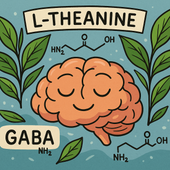
L-Theanine and GABA: Natural Calm for Parkinson’s-Related Anxiety
Anxiety in Parkinson’s often feels overwhelming — a constant inner tension that affects both body and mind. 🌿 This article explores how L-theanine and GABA, two natural compounds that promote relaxation without sedation, can help restore balance, ease restlessness, and calm the nervous system for a more peaceful state of mind. 🌙
-
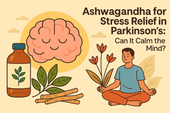
Ashwagandha for Stress Relief in Parkinson’s: Can It Calm the Mind?
Ashwagandha, the ancient Ayurvedic adaptogen, may offer powerful stress relief for people with Parkinson’s. 🌿 By regulating cortisol, calming the nervous system, and supporting dopamine balance, this natural herb helps ease anxiety, improve sleep, and promote emotional stability — restoring calm from the inside out. 🌙
-
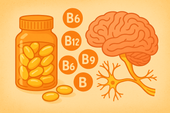
B Vitamins for Mood and Nerve Health in Parkinson’s Patients
B vitamins play a vital role in protecting the brain and nervous system in Parkinson’s. 🌿 From supporting dopamine production to reducing homocysteine and improving mood, these essential nutrients — especially B6, B9, and B12 — help stabilize emotions, boost energy, and preserve nerve integrity for better daily function and mental clarity. 💫
-
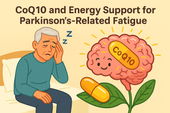
CoQ10 and Energy Support for Parkinson’s-Related Fatigue
Fatigue in Parkinson’s goes far beyond tiredness — it’s a deep cellular exhaustion. ⚡ CoQ10, a natural compound essential for energy production, may help restore vitality by supporting mitochondrial function and protecting brain cells from oxidative stress. Discover how CoQ10 can enhance energy, reduce fatigue, and improve overall resilience in Parkinson’s. 🌿
-
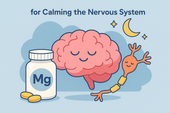
Magnesium for Calming the Nervous System in Parkinson’s
Magnesium is one of the most underrated allies for people with Parkinson’s. 🌿 This calming mineral supports the brain, relaxes tense muscles, and stabilizes the nervous system, helping reduce anxiety, restlessness, and sleep problems. Discover how magnesium nourishes dopamine pathways, protects neurons, and restores a sense of inner peace from within. 💫
-
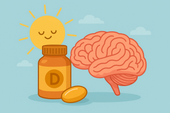
Vitamin D and Mental Health in Parkinson’s: Why Deficiency Matters
Vitamin D is more than a sunshine nutrient — it’s a key player in brain health and emotional balance for people with Parkinson’s. 🌞 This article explores how vitamin D influences dopamine, serotonin, and inflammation, and why deficiency can worsen depression, anxiety, and cognitive decline. Discover how restoring healthy levels can bring clarity, calm, and resilience back to daily life. 🌿
-

Omega-3s and Parkinson’s: Supporting Mood and Cognitive Clarity
Omega-3 fatty acids are among the most powerful nutrients for supporting brain health and emotional well-being in people with Parkinson’s. 🧠 This article explores how omega-3s strengthen neuronal membranes, improve dopamine and serotonin signaling, reduce inflammation, and promote cognitive clarity. Learn how these essential fats can help ease anxiety, lift mood, and protect your mind from oxidative stress naturally. 🌿
-
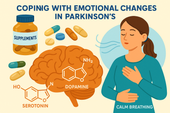
Coping with Emotional Changes in Parkinson’s: Supplements That Support Balance
Emotional changes like anxiety, depression, and irritability are common yet often overlooked symptoms of Parkinson’s disease. This article explores how supplements such as omega-3s, magnesium, and vitamin D can support mood regulation, while therapy and breathwork techniques help restore calm and emotional balance naturally. 🌿
-
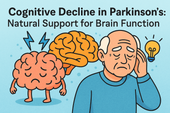
Cognitive Decline in Parkinson’s: Natural Support for Brain Function
Cognitive decline in Parkinson’s can affect memory, focus, and daily independence—but there’s hope. Understanding how the disease impacts brain chemistry opens the door to natural ways of support. From omega-3s and CoQ10 to mindfulness and exercise, you can nourish your brain, boost clarity, and slow decline through holistic care. 🌿🧠
-
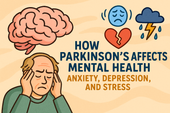
How Parkinson’s Affects Mental Health: Anxiety, Depression, and Stress
Dopamine is the brain’s spark of motivation—the chemical that fuels focus, pleasure, and drive. When dopamine levels are balanced, you feel inspired and alive; when they’re low, everything feels like an uphill climb. Understanding how dopamine works can help you support mental clarity, resilience, and emotional balance naturally. ⚡🧠
-
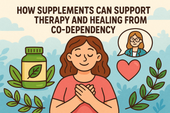
How Supplements Can Support Therapy and Healing from Co-Dependency
Biology is the science of life—an exploration of how cells, systems, and molecules create the foundation for every thought, emotion, and heartbeat. From the way our DNA shapes us to how hormones and neurons communicate, biology reveals the deep interconnectedness between mind and body. Understanding it helps us appreciate the delicate balance that keeps us alive, aware, and evolving. 🌿🧬
-
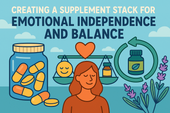
Creating a Supplement Stack for Emotional Independence and Balance
Biochemistry is the invisible language of life—how molecules, cells, and systems communicate to keep your body and mind in balance. From neurotransmitters shaping emotions to enzymes fueling energy, every process in your body reflects biochemical harmony. Understanding these reactions helps you see how nutrition, supplements, and emotions intertwine to support health, mood, and resilience. ⚗️🌿
-
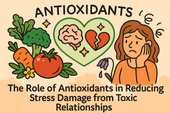
The Role of Antioxidants in Reducing Stress Damage from Toxic Relationships
Biology is the study of life in motion—the intricate dance between cells, systems, and the natural world. From DNA replication to neurotransmitter flow, every process in the human body reflects the intelligence of life adapting and evolving. Understanding this harmony helps us appreciate how nutrition, stress, and environment shape our health and emotional balance. 🌿🔬
-
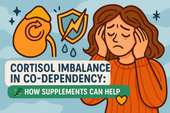
Cortisol Imbalance in Co-Dependency: How Supplements Can Help
Cortisol is the body’s main stress hormone—essential for energy and focus, yet harmful when chronically elevated. When life feels like constant pressure, cortisol imbalance can trigger fatigue, anxiety, and mood swings. Learning how to restore balance through rest, nutrition, and the right supplements can help you rebuild calm, clarity, and resilience from the inside out. 🌿💫
-
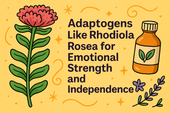
Adaptogens Like Rhodiola Rosea for Emotional Strength and Independence
Adaptogens are nature’s stress-balancing herbs—plants like Rhodiola, Ashwagandha, and Holy Basil that help your body adapt to emotional and physical pressure. They don’t numb or overstimulate; they teach your system how to find calm and stability again. By restoring balance to your hormones, energy, and mood, adaptogens nurture emotional resilience and grounded strength. 🌿✨
-
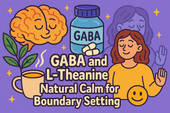
GABA and L-Theanine: Natural Calm for Boundary Setting
Anxiety can feel like a storm inside your mind—constant tension, overthinking, and the inability to relax even when you’re safe. But beneath the chaos, your body is simply trying to protect you. Learning to calm anxiety starts with understanding how your brain and nervous system respond to stress—and how to gently guide them back to peace. 🌿💫
-
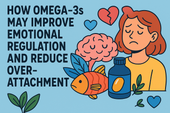
How Omega-3s May Improve Emotional Regulation and Reduce Over-Attachment
Inflammation isn’t just about sore joints or fatigue—it’s also a hidden driver of mood swings, anxiety, and emotional burnout. When chronic stress or poor diet keep the body inflamed, the brain’s chemistry changes, making calm harder to access. Learning how to reduce inflammation through nutrition, rest, and mindful living helps restore balance from the inside out. 🌿💫
-
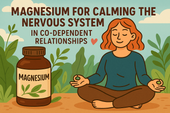
Magnesium for Calming the Nervous System in Co-Dependent Relationships
The nervous system is the body’s communication network, linking your mind and organs through a delicate web of electrical signals. It controls everything from emotional responses to muscle movement—and when it’s overwhelmed by chronic stress or anxiety, balance is lost. Learning how to calm and nourish your nervous system through nutrition, mindfulness, and rest can restore peace and emotional stability. 🌿💫
-

Ashwagandha and Co-Dependency: Supporting Stress Resilience
Stress is more than a feeling—it’s a full-body signal that your system is overwhelmed. When the mind races and the body tenses, your hormones, breathing, and focus all shift into survival mode. Chronic stress doesn’t just affect emotions—it reshapes your nervous system, drains your energy, and clouds your clarity. Learning to understand and manage stress gently is the first step toward peace, balance, and true recovery. 🌿💫
-

Why Co-Dependency Feels Draining: Adrenal Fatigue and Supplements That Help
The adrenal glands are small but powerful organs that sit above your kidneys, acting as your body’s built-in stress managers. They produce hormones like cortisol and adrenaline that help regulate energy, mood, and resilience. When they’re overworked from chronic stress or emotional exhaustion, fatigue and imbalance follow. Supporting adrenal health naturally can help restore calm, energy, and hormonal balance. 🌿⚡
-

The Link Between Anxiety, Co-Dependency, and Natural Support
Anxiety feels like living in constant alert mode—your heart races, your thoughts loop, and your body can’t find peace. It’s the nervous system’s way of preparing for danger, even when none exists. Understanding what’s happening in your mind and body is the first step toward calming the storm and restoring balance. 🌿💫
-

Supplements That Support Dopamine and Serotonin in Co-Dependent Patterns
Serotonin is the neurotransmitter of calm, confidence, and contentment. When it’s balanced, you feel peaceful and emotionally grounded. When it’s low, anxiety, mood swings, and emotional dependence take over. By understanding serotonin’s role in emotional health—and how to support it naturally—you can rebuild inner stability, improve relationships, and cultivate lasting happiness from within. 🌞💫
-

How Emotional Exhaustion in Codependency Impacts the Nervous System
The nervous system is the body’s communication network, connecting the brain to every organ and muscle. It regulates stress, mood, and emotion through a delicate balance of electrical and chemical signals. When overwhelmed, it can become dysregulated—leading to fatigue, anxiety, and emotional imbalance. Understanding how to calm and strengthen the nervous system is key to healing from chronic stress and emotional burnout. ⚡🌿
-

What Is Co-Dependency? The Role of Brain Chemistry and Stress
Stress is more than a feeling—it’s a full-body experience that begins in the brain and ripples through every cell. When cortisol surges and the nervous system stays on alert, your body can’t rest or recover. Over time, this constant tension affects energy, focus, mood, and even immune health. Understanding stress chemistry is the first step toward breaking free from burnout and finding calm again. 🌿
-

Creating a Supplement Stack for Motivation, Energy, and Anti-Procrastination
Motivation is the fuel behind every meaningful achievement—but it’s not just about willpower. It’s a mix of mindset, brain chemistry, and momentum. When energy, focus, and purpose align, action feels natural instead of forced. Learn how to harness motivation as a daily state, not a fleeting feeling.
-

Supplements for Building Consistency and Reducing Chronic Procrastination
Biochemistry is the bridge between biology and chemistry—the science of life at the molecular level. It explains how nutrients, hormones, and neurotransmitters interact to create energy, thought, and emotion. From brain function to muscle movement, biochemistry reveals the invisible processes that sustain health, balance, and vitality.
-

GABA and Procrastination: Supporting Calm Focus for Productivity
GABA is the brain’s natural calming messenger—a neurotransmitter that helps slow mental overactivity and ease stress. When GABA levels drop, focus fades, anxiety rises, and procrastination becomes more likely. By supporting GABA through nutrition, lifestyle, and supplements, you can restore calm clarity, improve focus, and take action with steady, balanced energy.
-

Ashwagandha and Procrastination: Lowering Stress to Improve Action
Science is the language of curiosity and discovery. It helps us understand the hidden patterns behind life, energy, and the universe. Through experimentation and critical thinking, science connects imagination to evidence—turning questions into knowledge. Whether through microscopes, molecules, or minds at work, science represents our endless pursuit of truth and innovation.
-

Neurotransmitters and Motivation: Supplements That Support Drive and Focus
Supplements can do more than boost physical health—they can also enhance mental clarity, focus, and motivation. Nutrients like omega-3s, magnesium, B vitamins, and adaptogens help balance neurotransmitters, stabilize mood, and support brain energy. When combined with good sleep, nutrition, and mindful habits, they can transform how your brain performs under stress.
-

How Stress Hormones Like Cortisol Fuel Procrastination (and What Helps)
Blood sugar isn’t just about physical health—it directly impacts focus, mood, and motivation. When glucose levels spike and crash, energy and attention do the same, fueling procrastination and brain fog. Learning how to stabilize blood sugar through balanced meals, mindful habits, and key nutrients helps keep your mind steady, focused, and ready to act.
-

Brain Fog and Procrastination: Supplements for Mental Clarity
Brain fog can turn even simple tasks into mental hurdles. When your thoughts feel slow and unclear, procrastination often follows—making focus and productivity seem impossible. This article explores the biochemical and lifestyle causes of brain fog and reveals the most effective supplements for restoring mental clarity, focus, and sustained energy.
-

The Link Between Low Energy and Procrastination: Can Supplements Help?
Neurochemistry shapes how we think, feel, and act. When neurotransmitters like dopamine, serotonin, and GABA fall out of balance, it can lead to fatigue, anxiety, or lack of motivation—fueling procrastination and low mood. Understanding the brain’s chemical communication system helps us find ways to restore focus, calm, and emotional stability through nutrition, mindfulness, and targeted supplements.
-

Why Do We Procrastinate? The Role of Dopamine and Supplements That Support It
Dopamine is the brain’s motivation messenger—the chemical that fuels focus, reward, and drive. When dopamine levels drop, even simple tasks can feel impossible to start. This article explores how dopamine shapes procrastination, motivation, and mental energy, along with natural supplements and daily habits that help restore balance and get things done.
-

Phosphatidylserine and Stress Reduction for People with BDD
Stress is more than a mental state—it’s a full-body experience that affects hormones, brain chemistry, and emotional balance. For people with Body Dysmorphic Disorder (BDD), constant tension and worry about appearance can overload the nervous system. Learning how stress works and finding ways to calm it is key to breaking the cycle of anxiety and self-criticism.
-

How Antioxidants Like Vitamin C & E Support Mental Health in BDD
Antioxidants are the body’s natural defense against stress and inflammation. For people with Body Dysmorphic Disorder (BDD), oxidative stress can worsen fatigue, anxiety, and emotional imbalance. Nutrients like Vitamin C and E help protect brain cells, boost neurotransmitter function, and support a calmer, clearer mindset—building a stronger foundation for recovery.
-

Ginkgo Biloba and Memory Support for BDD Recovery
Emotional regulation is the foundation of healing from Body Dysmorphic Disorder (BDD). When the nervous system stays in constant overdrive, even small stressors can trigger self-critical spirals. Learning to calm emotional reactivity helps restore clarity, confidence, and a sense of inner balance. By blending mindfulness, nervous system support, and self-compassion, you can retrain your brain to respond—not react—to emotion.
-

Alpha GPC and Cognitive Function in Body Dysmorphic Disorder
Mental fatigue can feel like your brain has hit a wall—thoughts slow down, focus fades, and motivation disappears. For people with Body Dysmorphic Disorder (BDD), chronic overthinking, emotional stress, and constant self-evaluation can deplete mental energy even further. Understanding what causes this cognitive exhaustion is the first step toward recovery—through rest, balanced nutrition, and targeted brain-supporting supplements.
-

N-Acetyl L-Tyrosine and BDD: Supporting Mental Clarity
Chronic stress doesn’t just affect your mood—it reshapes your brain chemistry, weakens focus, and fuels the obsessive thought loops common in Body Dysmorphic Disorder (BDD). Over time, constant cortisol elevation drains mental energy and emotional balance. Learning to recognize and manage chronic stress is essential to restoring mental clarity, self-compassion, and resilience.
-

Chamomile and Lavender for Calming Obsessive Body Image Thoughts
The nervous system is the command center of our emotional and physical world—and in Body Dysmorphic Disorder (BDD), it often operates in overdrive. Understanding how the brain and body communicate under stress reveals why intrusive thoughts feel uncontrollable. Learning to regulate the nervous system through calm practices, nutrition, and supplements helps restore inner balance and emotional safety.
-

Adaptogens for Body Dysmorphic Disorder: Rhodiola, Ginseng, and More
Rhodiola rosea, often called the “golden root,” is an adaptogenic herb renowned for boosting stress resilience and mental endurance. For individuals with Body Dysmorphic Disorder (BDD), Rhodiola may help reduce fatigue, regulate cortisol, and enhance emotional balance. By supporting both mind and body, this powerful plant promotes calm focus, improved mood, and renewed energy to face daily challenges.
-

B Vitamins for Stress Resilience in BDD: Rebuilding Calm from Within
Biochemistry is at the heart of every thought, emotion, and reaction we experience. In Body Dysmorphic Disorder (BDD), chemical imbalances in neurotransmitters like serotonin, dopamine, and GABA can amplify stress and distort self-perception. Understanding the biochemistry behind mood and stress regulation offers a path toward healing—bridging the gap between emotional experience and the body’s molecular balance.
-

Melatonin and Body Dysmorphic Disorder: Restoring Healthy Sleep Patterns
Melatonin, the body’s natural sleep hormone, plays a vital role in helping people with Body Dysmorphic Disorder (BDD) restore healthy sleep cycles. When anxiety and obsessive thinking interfere with rest, melatonin levels often drop, leading to more emotional reactivity and distorted self-perception. This article explores how melatonin works, why BDD disrupts it, and how natural supplementation—combined with mindful routines—can help the brain and body finally find calm at night.
-

Sleep Struggles with BDD: Supplements for Rest and Recovery
When you’re living with Body Dysmorphic Disorder (BDD), restful sleep can feel impossible—but the right supplements can help reset your body’s natural rhythm. From magnesium and L-theanine to 5-HTP and ashwagandha, these nutrients support relaxation, lower cortisol, and enhance melatonin production. This article explores how supplements can calm the mind, ease nighttime anxiety, and promote true restorative sleep for emotional and physical recovery.
-

5-HTP and Serotonin Balance: Could It Help with Body Dysmorphic Disorder?
Anxiety can feel like a storm inside the mind—restless, overwhelming, and hard to control. In people with Body Dysmorphic Disorder (BDD), anxiety often fuels obsessive thoughts and self-criticism, creating a painful cycle of worry and self-doubt. This article explores the biological roots of anxiety, the role of neurotransmitters like serotonin and GABA, and how natural strategies such as mindfulness, supplements, and nervous system regulation can restore calm and mental clarity.
-

Can Ashwagandha Help Ease Stress and Anxiety in Body Dysmorphic Disorder?
Neurotransmitters like serotonin, dopamine, GABA, and acetylcholine are the chemical messengers that shape how we think, feel, and react to stress. In Body Dysmorphic Disorder (BDD), imbalances in these neurotransmitters can amplify anxiety, obsessive thinking, and emotional distress. This article explores how restoring healthy brain chemistry through nutrition, supplements, and mindfulness can help bring clarity, calm, and emotional stability.
-

L-Theanine for BDD: Finding Calm in the Mind
Neurochemistry plays a central role in how we think, feel, and see ourselves. For those living with Body Dysmorphic Disorder (BDD), imbalances in neurotransmitters like serotonin, dopamine, and GABA can intensify anxiety, obsessive thoughts, and emotional distress. This article explores how regulating brain chemistry through supplements, mindfulness, and lifestyle changes can bring the nervous system back into harmony and restore inner calm.
-

Omega-3 Fatty Acids and Body Image Disorders: Supporting Emotional Health
Omega-3 fatty acids do far more than support heart health—they nourish the brain, stabilize mood, and may ease the emotional turbulence tied to body image disorders like BDD. This in-depth article explores how omega-3s regulate serotonin, dopamine, and inflammation, helping individuals reduce obsessive thoughts and rebuild self-acceptance. It also connects nutrition to therapy, mindfulness, and nervous system balance for holistic emotional healing.
-

Magnesium and BDD: Calming an Overactive Nervous System
Magnesium plays a crucial role in calming an overactive nervous system—something people with Body Dysmorphic Disorder (BDD) struggle with daily. This article explores how magnesium supports relaxation, emotional regulation, and stress reduction while diving into the science behind its connection to brain chemistry. It also examines how combining magnesium supplementation with therapy and breathwork can help rebalance the body’s stress response, reduce obsessive thought patterns, and promote lasting nervous system calm.
-

The Gut-Brain Axis and BDD: Why Probiotics Might Matter
The gut and brain are constantly in conversation — and that dialogue may shape how you experience Body Dysmorphic Disorder. By nurturing your microbiome with probiotics, prebiotics, and gut-healing nutrients, you can help rebalance serotonin, calm anxiety, and restore emotional stability from within 🧠🦠.

















































